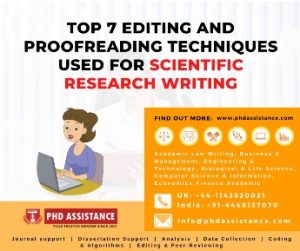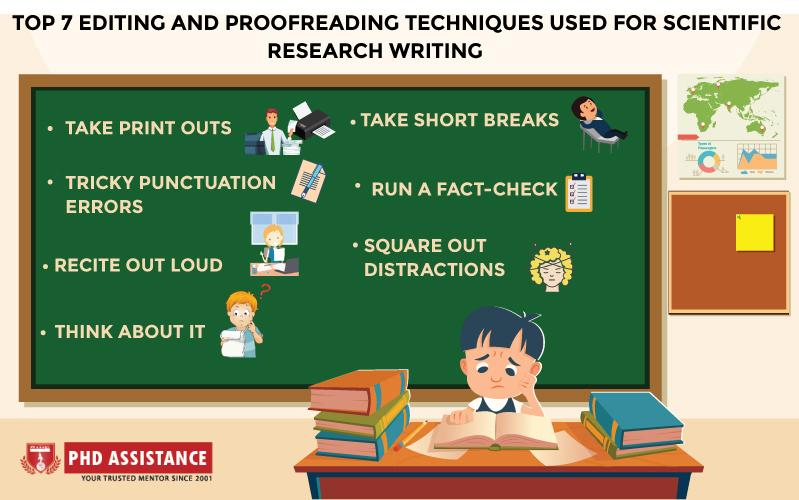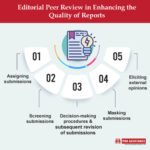Top 7 Editing and Proofreading Techniques Used for Scientific Research Writing
In-Brief:
- Proofreading is the final step of revising a Scientific Research Paper to locate mistakes in grammar, vocabulary, formatting and structure before the final version is released.
- The spell checker helps, but it is far from infallible. That is where proofreading comes in.
- PhD assistance suggests some essential techniques for proofreading your scientific research articles and offer PhD Dissertation Editing Services.

Introduction:
You frequently contribute weeks, months, and on occasion longer than a year composing an investigation, an educational paper, a necessary exposition, or a novel. PhD Dissertation Editing Help is significant when you finish the last draft. You get this unbelievable sensation of achievement. It is additionally the stage where your unique piece of composing requires intensive proofreading before it very well may be submitted to the pertinent individual or office for an audit or distribution. In any case, scarcely anybody finds proofreading energizing and especially with regards to extensive scholastic proofreading. Indeed, even the most academic people think it’s awkward and don’t wind up proofreading with similar power and responsibility that they exhibited while composing. And afterwards, there will be occurrences where you wouldn’t realize how proofreading is finished? You will ask yourself –
“How would I proofread my reports to make them great?” You have two options – either take professional help from PhD assistance with a glorious Doctoral Dissertation Editing Services/ Thesis Proofreading Services. Else follow these seven demonstrated procedures to guarantee your composing is without mistake and fit to be distributed for the worldwide crowd.
Top 7 editing and proofreading techniques used for scientific research writing
Take Print Outs:
Regardless of how cautiously you read on a PC or a Smartphone, the odds of you passing up mistakes are practically 100% – especially if the archive runs into a few pages. When you have the printed duplicates, you will see that you can get all the incorrectly spelt words without hardly lifting a finger. One of the fundamental reasons it’s simpler to recognize mistakes on a paper is that a printout doesn’t strain your eyes like an electronic gadget’s illuminated screen does.
Interesting Punctuation Errors:
Misspelt words in your composing are clearly bothersome, yet accentuation mistakes – however, may seem innocuous – can likewise raise a ruckus. A misplaced comma, punctuation, period, colon, and quote can change the significance of a sentence and make your composing look amateurish from PhD Thesis Editing Service.
Recite Out Loud:
You may recall that one colleague in the centre or secondary school who had this irritating propensity for perusing resoundingly. Presently it would help if you did precisely that. Why? Since reciting so anyone can hear not just fends you from floating off in contemplations, it likewise keeps you much more locked. Thus, it brings about you spotting words that aren’t linguistically mistaken, yet maybe not the best word decisions. Similar remains constant for fortifying sentence structures and recognizing run-on sentences. Every one of these zones gets improved when you read your composition for all to hear.

Take Short Breaks:
Do not proofread at a long-distance race stretch. Take regular breaks, or you will undoubtedly supervise a mistake, which will nullify the general purpose of proofreading. A fantastic general guideline to follow is to proofread for 45 minutes and enjoy a ten brief reprieve. Guarantee that throughout the break, you don’t utilize electronic gadgets. This break is to rest your eyes and brain. Get off your work area, stretch a bit, drink some water or espresso, or go for a short stroll or just set down with your eyes shut. Taking four breaks more than 4 hours will give you unrivalled outcomes than proofreading for 4 hours in a row using Thesis Proofreading and Editing Service.
Run a Fact-Check:
Keep an eye out formal people, places or things, figures, measurements, and so on Aside from spellings and language, you need to actuality verify that each snippet of data is precise and refreshing. Basic mistakes like inaccurately phrased (something the spellcheck may not pick) University name, organization name, or obsolete insights or classification slip-ups can genuinely make your composition – research or innovative – miss out on validity.
Square Out Distractions:
In this day and time of ever-present web and vast web-based media applications, TV shows, films, email warnings, web based shopping destinations, and so forth, competing for our consideration day in and day out, it’s vital that once you plunk down to proofread, your consideration is unified. A minor interruption can without much of a stretch lead to an exclusion that you would have gotten had you not been occupied by that signal of your Smartphone advising you about the most recent stories on Instagram. In any case, it’s not merely the innovation that fills in as a snag; there could be vast loads of different reasons, for example, a baby in the house who’s continually crying, bratty youngsters, a pet canine or feline, loud environmental factors. And so forth Whatever the components that may meddle and cause interruption, should be disposed.
Think About It:
Unless it’s a short article of up to 10 pages or, there’s a critical cutoff time you need to meet. It’s prudent to consider it. Continuously proofread everything twice – yet never around the same time. Proofread your work with all the constancy conceivable on Day 1 [or however many days as it takes to proofread it thoroughly]. Hit the sack on schedule and get your 8-hour rest. The following day, proofread everything with open-minded perspectives.
Conclusion:
PhD Assistance will offer a neutral insight into the article, check on word practice by identity, and adjust words or phrases that regular spellcheckers will not clip. We also check for the spelling errors and correct info, check for capitalization, grammar, and punctuation mistakes also provide you with Academic Editing and Proofreading Services.
References:
- McNaughton, D., Hughes, C., & Clark, K. (1997). The effect of five proofreading conditions on the spelling performance of college students with learning disabilities. Journal of Learning Disabilities, 30(6), 643-651.
- Personke, C., & Knight, L. (1967). Proofreading and spelling: A report and a program. Elementary English, 44(7), 768-774.
 Previous Post
Previous Post Next Post
Next Post
